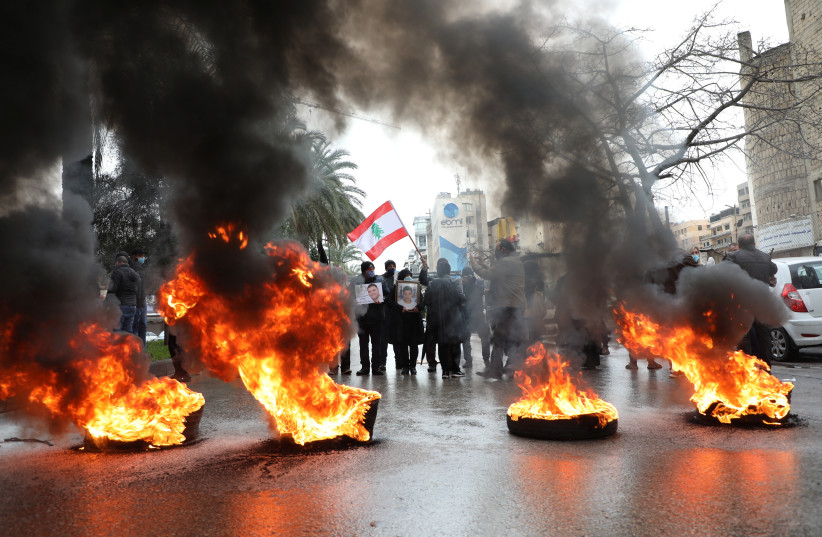Relatives of those killed in the 2020 Beirut port blast say they have become targets of the judiciary instead of senior officials who have still not been held to account for the huge explosion that devastated Lebanon's capital and killed 220 people.
A dozen people were summoned for questioning on Monday after protests last week at the justice palace, where relatives often gather to demand accountability. Friday's detention of an activist drew condemnation from the head of the Maronite church.
But hopes for justice are fast fading. A political elite that has dominated Lebanon's fractured sectarian system for decades has paralyzed the work of an investigating judge who tried and failed to question top officials. Only minor functionaries have so far been brought in by the authorities.
"It's absurd and disgusting that we're the ones being brought in for questioning," said William Noun, who was detained overnight on Friday after a protest last week seeking justice for his brother who was killed in the Aug. 4, 2020 blast.
"It's absurd and disgusting that we're the ones being brought in for questioning,"
William Noun
"There's a deliberate attempt to drain the families," said Noun, a prominent figure in the campaign and who was also among those called for questioning on Monday on what he said were accusations of rioting at the justice palace.
Noun's detention drew crowds to the police station until his release on Saturday and prompted a stern rebuke from Maronite Patriarch Bechara Boutros Al-Rai, Lebanon's most senior Christian cleric.

"Aren't they ashamed of themselves after they requested the arrest of William Noun, the search of his house and his imprisonment, not caring for his tragedies and the tragedies of his family?" Rai said, calling the judiciary "a tool for vengeance, malice and hatred."
A judicial source said Noun was detained over "threats to the judiciary." In last week's protests, a witness said rocks were thrown at the justice palace and windows were broken.
Lebanese media broadcast footage of Noun at the protest saying protesters had prepared "men, rioters, dynamite and rocks" if the judiciary appointed an additional investigator to the probe, a move families fear was designed to hobble it further.
"We are not afraid"
With investigating Judge Tarek Bitar hamstrung, judicial sources say the additional judge would have the power to release detainees, which could include the port's former customs chief, one of the functionaries detained.
Families say politically-affiliated detainees could also be released and those behind the blast would continue to roam free.
"They think we will forget, or we'll get bored, or they'll pressure us so much that we will get scared and drop it," said Mariana Fadoulian, whose sister was killed in the blast and who joined the protest demanding Noun be released.
"They think we will forget, or we'll get bored, or they'll pressure us so much that we will get scared and drop it, We're not afraid of anything. We're asking for our rights – and the rights of all Lebanese"
Mariana Fadoulian
"We're not afraid of anything. We're asking for our rights – and the rights of all Lebanese," she said.
For many Lebanese, the failure of the probe into the blast reflects impunity of the elite that has overseen decades of corrupt rule that led to financial collapse in 2019 and the worst crisis since a 1975-1990 civil war.
The explosion was caused by hundreds of tonnes of chemicals kept in poor conditions for years at the port.
Bitar, the probe's second investigating judge after the first was removed, sought to interrogate top figures in the Shi'ite Muslim Amal Movement, an ally of the Iran-backed and heavily armed Hezbollah movement. He had also sought to question the then Sunni prime minister.
But senior officials who were called resisted being questioned, saying they had immunity or said Bitar lacked authority to prosecute them. They denied any wrongdoing.
The probe has been paralyzed since judges in a court that must rule on complaints against Bitar retired. The issue is unresolved.
A Hezbollah official told Bitar the group would remove him from the probe, sources said, while Hezbollah's leader Sayyed Hassan Nasrallah said Bitar was biased and should be replaced.
The court of cassation removed Bitar's predecessor, Judge Fadi Sawan, in 2021 following high-level political pressure. Two former ministers he charged - Ali Hassan Khalil and Ghazi Zeaiter of Amal - had demanded he be removed from the case.
